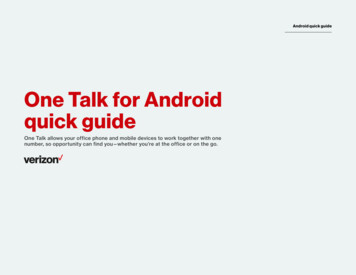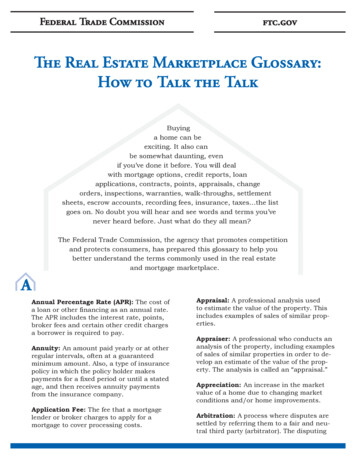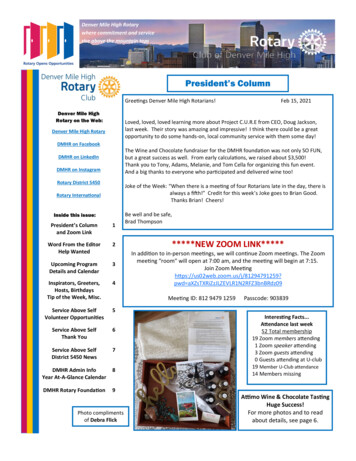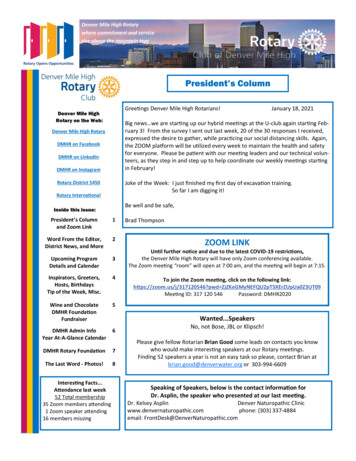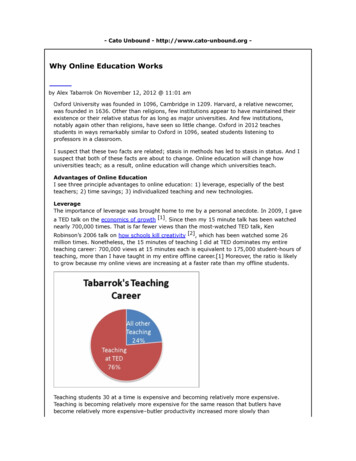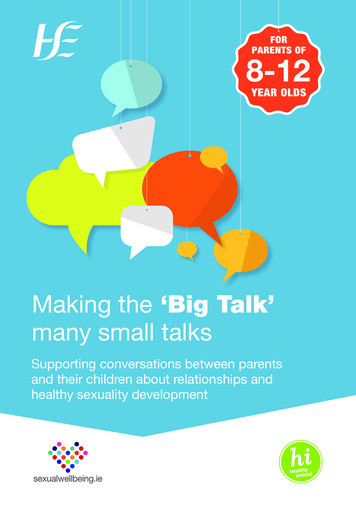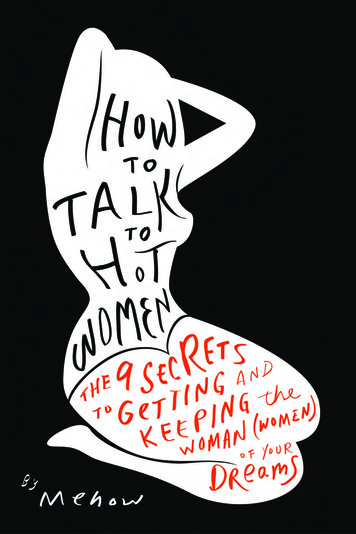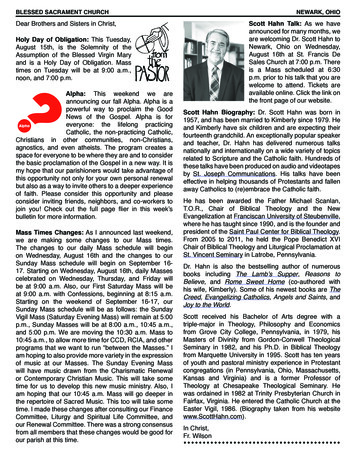
Transcription
We Need To Talk About CaringA survey into the scope and scale of caring acrossthe screen industriesJune 2019“It’s such a competitive industry, and especially being a producer thereis often no one else to discuss the issue with. Everyone is relying on meto be the stable one, to provide them with reassurance and care. Thereis no one to reassure or care for me.”#WeNeedToTalkAboutCaringraisingfilms.com
ContentsForeword.1Introduction.244%Key Findings. 431%Survey Profile.6Caring Responsibilities. 11The Many Costs of Care.6%16How Do Creative Employers Manage Carers?. 21Good Practice. 25What Next. 26Moving Forward & Raising Films. 27Survey Questions. 28References. 36Resources. 39Report TeamWe Need To Talk About Caring was a collaborative research project led by Dr. Tamsyn Dent(Research Associate, King’s College London) and Mounira Almenoar (Project Manager, Raising Films).Research Assistants:Herval Almenoar-Webster (PhD Candidate, University of West London)Cat Forward (PhD Candidate, University of West London)Sarah Louise Smyth (PhD Candidate, University of Southampton)Raising Films Communications Manager: Sally HodgsonReport Design: Eilidh WalkerAcknowledgementsThe Film & Television Charity, Equity UK, Malcom Moore, Carers UK, Ming Ho and Bonnie-Chance Roberts.June 2019
ForewordRaising Films is in the business of making thebusiness better.Since we formed in 2015, we have uncovered goodpractice and bad; we have gathered stories thatinspire and those that infuriate. We have built acommunity of people from all over the world whorecognise the systemic discriminations built intothe screen industry, and who want it to change. Wehave run training schemes, created a thriving onlinecommunity, and done research into the factorsthat exclude parents and carers from sustained andcontinually developing careers in the industry.Our previous research has looked at the impactof parenting on those employed in the screensector and the lack of robust accountabilityframeworks to support the rights of those withinthe screen workforce with caring responsibilities.From responses to our initial Making it Possiblesurvey in 2016, and subsequent conversations withmembers of our community, we learned that carefor dependents other than children was an issuethat many were silently dealing with. Some wereattempting to return to work after years out caring forelderly parents, others were balancing care for theirsibling, partner or friend with part-time work, somehave dependent children with additional needs thatmade them both parent and carer, and many weredealing with multiple combinations of these caringneeds as ‘sandwich’ carers; those who have caringresponsibilities for both dependent children andelderly and/or disabled relatives (Carers UK 2012).So, as with our parenting survey, we set out to dothe first exploration into how caring affects those inthe screen sector and, most importantly, to identifysome solutions that can help employers, supportorganisations and individuals, making caring partof the conversation.Carers demonstrate empathy, time managementand resourcefulness on a daily basis – skills whichare needed, alongside the creative, craft, technicaland business skills the industry thrives on. At a timewhen there is a shortage of production staff in theUK screen workforce, as highlighted by ScreenSkillsin their work on the Future Film Skills Strategy, weare losing valuable talent. We hope this report helpsyou understand what a vital part of our workforcecarers can be.Hope, Jess, Line, Nicky and So(Raising Films Founders)Laura, Mounira, Sally and Tamsyn(Raising Films Team)raisingfilms.com #WeNeedToTalkAboutCaring1
IntroductionWhy Do We Need to Talk About Caring?An estimated 6.5 million people are currently listedas carers in the UK.With an ageing population and consistent statefunding cuts to social health care provision, manymore of us will have to take on caring responsibilitiesin the future.Carers UK, the national membership charityfor carers, estimates that there will be 9 millioncarers in the UK by 2037.But what is a carer? A carer is anyone who caresunpaid for a family member or a friend who, dueto illness, disability, a mental health problem oran addiction, cannot cope without their support.What we mean by ‘care’ is more complicated. On afundamental level, care is vital for the survival of allliving things so anyone who has responsibility foranother living being can be considered a carer.Why carers?The Raising Films ‘We Need to Talk About Caring’survey is the first investigation into carers workingin the UK screen sector. We wanted to consider theparticular impact that caring responsibilities have onthose within the screen workforce, focusing on thosewho care for people other than dependent children;that is, for partners, relatives or children with specificdisabilities. Some of our respondents also care fordependent children and their data is included inthis report.The survey was launched on Monday 11 March andstayed open for a period of six weeks. We used thehashtag #WeNeedToTalkAboutCaring to connect allmentions of the survey on social media (primarilyTwitter). We sent the survey link out through ourmonthly Raising Films newsletter and spreadawareness of the survey through British screenbased organisations and companies including: BBC,BECTU, BFI, Club des Femmes, Creative England,2Creative Scotland, Directors UK, Equity, Ffilm CymruWales, Independent Cinema Office, Oska BrightFestival, the Production Guild, Regional Film Hubs.44%Screen Skills, Screen Scotland, Shooting People,Times Up UK, Women in Film & Television, WomenOver 50 Film Festival and the Writers Guild31%ofGreat Britain.We also received coverage from specialist carersupport organisations and charities, includingCarers UK, Carers Network, Carers Trust andEmployers for6%Carers.Our aim was to gather responses from as wide avariety of screen workers as possible in order to trackdifferent experiences of care and creative work, andto attract responses from all genders, ethnicities,ages, abilities and regions. There were 58 questions,inviting respondents to provide information abouttheir identity and employment, and also to givethem an opportunity to share their stories of care.We gathered a total of 135 responses to our carerssurvey. The data has been analysed thematically,enabling us to develop our understanding of whocarers are and what support they need.Cared-for surveyAlongside the survey into the experiences of carerswithin the industry, we launched a separate surveyfor those who are cared for and work in the screensector. There were only 11 responses to this surveyand we weren’t able to gather enough informationto enable clear policy recommendations. The lackof information points to the wider absence ofworkers with disabilities in the screen sector,an issue that would benefit from further,targeted investigation.Why the screen sector?This report adopts the term ‘screen sector’ or ‘screenworker’ to represent workers whose primary form ofoccupation is within the audio-visual/screen sectorof the UK’s creative industries.June 2019
IntroductionThe term ‘creative industries’ refers, in official terms,to “those industries which have their origin inindividual creativity, skill and talent and which havea potential for wealth and job creation through thegeneration and exploitation of intellectual property”(Department for Digital, Culture, Media and Sport,[DCMS] 2001). This definition includes sectorssuch as advertising, architecture, crafts, fashion,IT, publishing, museums and galleries, music andthe visual arts, alongside the screen sectors whichinclude animation, film, television, visual effectsand photography.We appreciate that these labels can be confusing,particularly to those who may work across a numberof different creative and cultural sectors.workers in a particularly precarious labour marketand many local councils without sufficient fundingto meet the growing care needs. Lydia Hayes coinedthe term ‘institutionalised humiliation’ to definethe devaluation of paid carers within the UK (2017).Further studies have shown that unpaid caringresponsibilities are equally devaluedand/or silenced.We need to talk about caring. We have a growingscreen sector, we have specific skills shortageswithin the sector (Screen Skills 2018), and we havea fragmented and exploited workforce, framed byan ineffective and exclusionary workforce structurewhich results in the loss of talent and skills.The rationale for a detailed investigation into theexperience of carers is their absence from currentconsiderations of inequality issues among theUK’s screen workforce. The UK’s creative sectoras a whole is a growing sector, the latest DCMSreport (2017) estimates that the creative industriescontributed 101.5bn to the UK economy in 2017,an increase of 53.1% since 2010. Despite this rapidgrowth, the creative workforce is permeated bypervasive systemic inequalities. Research hasexposed the barriers to employment and includeintersecting factors such as gender, ethnicity,geographical location, social class, age, ability andsexuality. We want to add caring responsibilities tothis list of recognised characteristics, particularly ascare is a responsibility that affects all genders, allraces, all ethnicities, all social classes, and is an issuethat will grow exponentially, concurrent with theexpansion of the creative economy.It is estimated that unpaid carers contribute 132billion per year to the UK economy (Carers UK2018). That is more than the gross value of the entirecreative industry. And yet, care and care labour areconsistently undervalued within our society, bothas an economic contributor and as an activity morebroadly. In the UK, state, social and community careprovision has been subject to a range of funding cutsand forced privatisation. This has left many paid careraisingfilms.com #WeNeedToTalkAboutCaring3
Key FindingsAlthough the majority of our respondents identifiedas female, we also had representation from men andthose that identified their gender as actofImpactCaringofCaring82% of respondents stated that the impact ofcaring on their role in the screen industries hasbeen somewhat or strongly negativeFinancialSupport62% of respondents stated that they received nofinancial support for their caring responsibilities458% of respondents stated that they combined childcarefor dependent children under the age of 18 withineducation alongside their caring responsibilitiesBenefits59% of respondents stated that their experiencesof finding out about and claiming benefits waseither ‘difficult’ or ‘very difficult’Carers49% of respondents said they do not refer tothemselves as a carerJune 2019
Key FindingsThere was a strong desire from respondents toremain working within the industry:TheFuture81% of respondents said they intend to continueworking in the screen industries for the nextthree yearsI Am Breathing. Emma Davie and Morag McKinnonCourtesy of SDI by Matt Pinderraisingfilms.com #WeNeedToTalkAboutCaring5
Survey ProfileThe Raising Films We Need to Talk About Caringsurvey gathered a total of 135 responses fromcarers who work within the creative screen sector.This included four responses from individuals wholived outside the UK; however, their data has beenremoved from this report as our focus is on therelationship between care and creative work withinthe UK.Gender59% of carers over 85 are men and 41% are women(Carers UK 2015).36% of our respondents were aged between 4554 and 34% were aged between 35-44. Those whoidentified their gender as other were predominantlywithin the 45-54 category, and 29% of men werebetween the ages of 55-64. This corresponds toCarers UK data that men are more likely to havecaring responsibilities as they age.Although women occupy approximately 33% of rolesacross the UK screen industry (Directors UK 2016;Creative Skillset 2014) they represent the majority ofresponses to this survey.16 - 245%11%25 - 343%Other34%35 - 4436%45 - 5421%Male14%55 - 6475 Gender76%FemaleOur survey reflects the data on the unequaldistribution of caring responsibilities to womenin the screen industry which, until this survey,has concentrated on women with childcareresponsibilities (Creative Skillset 2010; Making itPossible 2016). Official data on carers howevershows a different gendered balance. 58% of carersare female and 42% are male. Age has an impacton the timing of caring responsibilities. Women aremore likely to face caring responsibilities by the ageof 50, whereas men are more likely to have caringresponsibilities by the age of 75. 1 in 4 women and1 in 6 men aged 50-64 have caring responsibilities.644%Age1%Age also has implications for those who are‘sandwich carers’, also referred to as ‘dual carers’,i.e. those who have caring responsibilities for bothdependent children and elderly and/or disabledrelatives (Carers UK 2012).76 respondents (58%) stated that they combinedchildcare for dependent children under the ageof 18 within education alongside their caringresponsibilities. This was spread across all genders.Carers UK data show that women are more likelythan men to be ‘sandwich carers’ and that thespecific pressures of ‘sandwich caring’ hasserious implications for an individual’s physicaland mental health.June 2019
Survey ProfileSexuality17% of respondents within our survey identified theirsexuality as lesbian, gay, bisexual or other. 12% ofwomen identified as lesbian or bisexual, and 29% ofmen identified as gay. Of those stating their genderas other, 1 stated they were heterosexual, 2 bisexualand 1 other.6%4Bis % OtLe exu hersbian al8%Gay2%Region92% of our respondents reside in England, 1%Northern Ireland, 5% in Scotland and 2% in Wales.esalW d2% lanotnSc hert5% or ndN la1% IreCreative Skillset (2014) found that 7% of the creativemedia workforce identify as LGBTQ , a slightlyhigher proportion than within the UK populationof between 5-7% (based on estimates by the UKcharity Stonewall).Our survey corresponds with industry-wide datathat there is a significant representation of LGBTQ individuals within the screen sector who have caringresponsibilities, and we recommend further researchinto the relationship between sexuality and care.RegionSexuality81%HeterosexualThere is little information on or for Lesbian, Gay,Bisexual, Transgender and Queer or Questioningcarers. The Carers UK policy briefing (2015) estimatesthat there are around 390,000 LGBTQ carers inBritain. Carers UK Wales have produced a reporthighlighting some of the particular issues andchallenges faced by LGBTQ carers (2017). Researchconducted by Stonewall revealed that one intwenty (5%) staff in the social care profession havewitnessed other colleagues discriminate against, orprovide poorer service to, a patient or service userbecause they are lesbian, gay or bisexual(Stonewall 2015).raisingfilms.com #WeNeedToTalkAboutCaring92%EnglandThe regional data we collected is similar to that ofthe 2015 Creative Media Industries EmploymentSurvey, both in terms of breakdown for each nationand for specific regions within it (Creative Skillset2015). Data yielded from our survey illustratesthat 39% of our respondents resided in GreaterLondon, 28% resided in the South East, 12% residedin the South West, 7% resided in the North West,6% resided in the West Midlands, 5% resided inYorkshire, 2% resided in the North East and 1%resided in the East Midlands.7
Survey ProfileEthnicity82% of our respondents identified as White, 13%indicated that they were of a Mixed/Multiple orAsian/Asian British ethnicity and 5% identifiedas Other.13%Mixed/Multiple,Asian/Asian BritishLevel of Education5%Other87% of respondents in our survey have a highereducation qualification. This is congruent with datacollected by Creative Skillset (2014) suggestingthat 78% of the creative media workforce have anundergraduate degree.Ethnicity82%WhiteOur data on ethnic identity reflects the underrepresentation of BAME workers in the creativescreen sector. This is particularly striking in London,which had the greatest regional representation inthis survey. Official UK census data reveals that over40% of the population within London identify asBlack/Asian/Mixed or Other ethnic group whereasonly 11% of workers across the creative industries(which includes sectors across architecture,publishing and IT as well as the screen sector) are ofBAME background (Creative industries Federation,[CIF] 2015).The relationship between ethnicity and care is worthnoting. Data collected by Carers UK (2011) indicatesthat there are 503, 224 Black, Asian or Minority Ethnic(BAME) carers in England, with London having thehighest number of BAME carers nationally of anyregion. Carers UK (2011) data illustrates that 43% ofBAME carers in England live in London.8The significant under-representation of BlackBritish voices in this survey, given the highproportion of Black British individuals in London,acting as carers, is striking and requires furtherinvestigation into the barriers excluding them fromthe UK screen sector.Education87% of respondents have higher educationqualificationsType of ContractRespondents in the survey were more commonlyemployed on part-time freelance orself-employed contracts.76% of men and 51% of women participants are ineither full or part-time freelance, or other roles.Men were more likely to work full-time in freelancepositions in the comparison to women, with41% of male and 15% of female respondents inthis position.June 2019
Survey ProfileWomen were more likely to be in permanentemployment in comparison to men, with 15% offemale respondents and 12% of male respondentsindicating that they are in permanent employmentwithin the screen industry. This corresponds withindustry monitoring data that indicates womenare more likely to be employed in permanent roles(Creative Skillset 2914).The most common job role for women waswriter/screenwriter, at 23%. Only 16% of womenindicated that they were directors, which is less thanhalf the rate of our male respondents. This relatesto wider industry evidence of the continued underrepresentation of women in directing roles(Directors UK 2016).7% Training7%Producer & Skills 7% Education7%On-screen (cast)& ernthiDi3%%The most common job role reported by men wasdirector at 40%, followed by crew and writer/screenwriter which each had respondent rates of13%.7st)5%21%Freelance/selfemployed f/tCaillsWorkStatusCurrent Roles40% istributionSkmEm ing forpaid e13%DirectorDeloven/tio iaauc mEd cade7% A15%Crew22%Writer/ScreenwriterBAME respondents to this part of the survey werefew, with 20% of respondents indicating theyare writers/screenwriters and 38% directors. OurLGBTQ respondents were mainly directors, with44% indicating this was their job role. The next mostcommon role for our LGBTQ respondents waswriter/screenwriter, with a response rate of 19%.13% Crew13% Writer/Screenwriterraisingfilms.com #WeNeedToTalkAboutCaring9
Survey ProfileEarningsBAME respondents earned the least. 66% ofBAME respondents earned less than 10,000per year in comparison to 34% of our whiterespondents.44%The chart below illustrates the earnings ofall respondents.Under 10,00036% 10,000 19,99926% 20,000 29,9998% 30,000 39,9998% 40,000 49,999Over 50,00010%13%Cotton Wool. Writer/Director: Nicholas ConnorProducer: Mark Quinn. Courtesy: Cherwell Productions10June 2019
Caring ResponsibilitiesIn this section, we offer a snapshot of the reportedcaring responsibilities and circumstances thatpresent challenges for screen workers in the UK.As stated in the introduction, a carer is anyone whocares, unpaid, for a family member or a friend who,due to illness, disability, a mental health problemor an addiction, cannot cope without their support(Carers UK; Carers Trust). More broadly, care can bethought of as an ethical framework (Gilligan 1982),a way of valuing individual development throughstages of attentiveness, responsibility, competenceand responsiveness (Tronto 1993).The concentration of creative and screen jobsaround the South East of the UK and particularlyLondon has been identified as creating specific entrybarriers to young people, or those from lower socioeconomic status from creative employment (Oakleyet al. 2017). Our survey adds carers to those who areaffected by the mass concentration of employmentin the South East, highlighting the need to considerthe lack of wider social care for those who do nothave relatives or support networks living in a closegeographical proximity.Others spoke of the physical risk that they weresubject to because of a complicated health issue.“I looked after my brilliant Dad who has dementia until I was assaulted by him.”Female, Writer/Screenwriter, 45-54With such broad boundaries around definingwhat constitutes as ‘care’, our survey did not askrespondents to tick boxes corresponding to predetermined labels. Instead we invited them todescribe their caring circumstances. In total, 67individuals shared their stories. Responses wereanalysed thematically to identify experiences thatcan develop our understanding of who carersare and what support they need. Situations werecomplex and varied. Respondents cared for parents,other relatives, partners, siblings, and/or childrenwith disabilities. Needs ranged from age-relatedconditions; cancer and/or other complex healthissues; disabilities across a range of ages; mentalhealth issues and addiction.The continued deregulation and privatisationof social care has led to reduced funding andcommunity support for the UK’s growing ageingpopulation (Carers UK, 2018 ; Hayes, 2017). Thelast five years have seen a 160 million decreasein the funding for care for older people despite aclear increase in need, leading to an estimated 1.2million people with unmet care needs (Age UK,2019; Kingson et al., 2018). Caring for people withcomplicated issues is a difficult task both physicallyand mentally as the comment above and othercomments in our survey illustrate. Workers from thecreative screen sector do not necessarily have theskills or support to manage these complex issues.Respondents spoke of their issues aroundgeographical distance and care.“I was a long-term carer for my Mother who was bipolar. Over the course of this period(20 years) my Mum became increasingly more dependent, as her physical healthdeteriorated too. As I lived in London and she lived in Scotland, for the last 10 years,this often meant a dash to Scotland to deal with a crisis, staying for weeks at a time.”Female, Producer, 45-54raisingfilms.com #WeNeedToTalkAboutCaring11
Caring ResponsibilitiesMany spoke of the secondary impact of care: thisinvolves the impact of finances, relationships,feelings of isolation, and on the individual’s ownphysical and mental health:44%“My partner has been off work since a surgery that did not heal in January 2018. It hashad a major effect on finances and our relationship, we only started to receive benefitsin Feb 2019.”Male, Non-disclosed job title, 25-34“My mum is 92 and has had symptoms of dementia for over 20 years; she has been inresidential care for nearly 8 years, but prior to this I was her distance carer for over 10years, to the detriment of my career, finances and personal life. It has been exhausting,draining, heartbreaking in every way.”Female, Writer/Screenwriter, 45-54We also found evidence of the competenciesthat are developed by caring work. Examplesincluded aptitude, organisational skills, leadership,management, empathy and resilience:“I looked after my mother full time for over a year when she was diagnosed withterminal cancer, nearly 13 years ago. Since then I have cleared her home out, soldthe contents, completed the maintenance on it, rented it out for her to help with carehome fees and dealt with tenants. My mother went into residential care when shecould no longer walk, and I was pregnant with my third child. She regularly needs helpwith her paperwork, hospital appointments, visits and just general help. I see her oncea week at least.”Female, Writer/Screenwriter, 45-54“I care for my partner who is paralysed. For over 20 years I’ve not been able toaccelerate my writing opportunities with care. Mostly frazzled on a daily basis but alsoquite resilient.”Female, Writer/Screenwriter, 45-5412June 2019
Caring ResponsibilitiesThe Stigma of CaringDespite the themes of resilience and the cleardemonstration of competence that emerged fromour analysis, we also found evidence of exclusionand stigma in relation to how respondents identifiedwith their carer role. Our findings relate to widerresearch that exposes how the continued devaluingof caring responsibilities in the developed world hascreated a climate of stigma, and even shame, aroundcaring responsibilities (Hayes 2017).49%Our respondents said they do not refer tothemselves as a carerWhen asked to explain why, responses highlightedthemes of stigma in the workplace; not feeling theywere able to share; not being asked; or a sense thatit was their duty and therefore not something theycould articulate as an activity in and of itself.The reluctance to broadcast caring responsibilitiesemerged across a number of the questions withinthis survey and were linked to various causes andconsequences. One was a relationship betweencarers in the screen sector and the benefits system.When asked if they had been informed aboutthe range of benefits available to carers, 63% ofrespondents stated ‘no’ tended to be older, onaverage, than those who reported ‘yes’, indicating aneed to ensure information is accessible to allage groups.63%Our respondents stated they hadn’t beeninformed about the range of benefits availableto carersOf all the survey respondents, only 13.3% receivedCarers Allowance (CA), 6.6% received DisabilityLiving Allowance (DLA), and 7.4% received HousingBenefit (HB). This is unsurprising given the criteriafor financial support for carers; for example, toqualify for CA must care for someone over 35 hoursper week.“Whilst the understanding around childcare has developed, caring for an adult is lessso, there is still a high level of fear and stigma attached to complex and chronic illnessand we have seen friends disappear.”Female, Creative Director in Exhibition, 45-54raisingfilms.com #WeNeedToTalkAboutCaring13
Caring Responsibilities“It’s a very difficult system to understand and access. The new UC system is online, asare so many services, it is difficult to find the right help as it is all outsourced.”Female, Production Co-ordinator, 35-44Recent changes, which have seen the gradual moveto Universal Credit (UC) replacing six other benefits,have increased the difficulty in understanding oraccessing support.There was a theme of suspicion concerning thecomplexity of the benefits system, expressed asthe idea that lack of public awareness meant thateligible carers were not able to claim support.When asked about their experience of finding outabout and claiming benefits, 59% stated that it waseither ‘difficult’ or ‘very difficult’.There was also a theme of stigma followingencounters with those that worked within thebenefits system, whereby respondents felthumiliated by the very system that is meant tosupport them.59%Our respondents stated that their experiencesof finding out and claiming benefits was either‘difficult’ or ‘very difficult’“I found that the DWP treated you as both a failure and potentially a criminal at everyturn of the benefits claiming process. That there was an ingrained attitude of bothcontempt, distrust and active hostility.”Female, Training and Skills, 35-44“The forms for DLA are time consuming and lengthy, including the renewal of benefit,even though my daughter’s condition is unchanged.”Female, Producer, 35-44“My mum was disabled my entire life so I know more than most and if there’s onething I learnt about the care system is that, if people don’t have to tell you somethingthey won’t.”Male, Production, Crew Member, 25-3414June 2019
Caring ResponsibilitiesIt is clear from our survey that there is a gapbetween support services and
races, all ethnicities, all social classes, and is an issue that will grow exponentially, concurrent with the expansion of the creative economy. It is estimated that unpaid carers contribute 132 billion per year to the UK economy (Carers UK 2018). That is more than the gross value of the entire creative industry. And yet, care and care labour are


